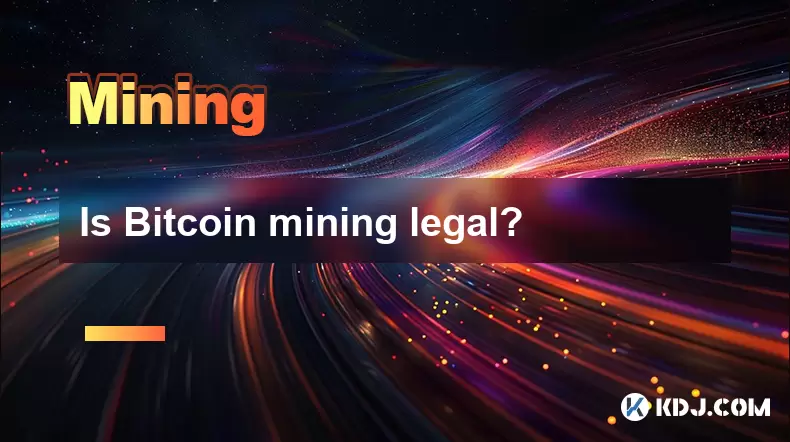-
 bitcoin
bitcoin $87959.907984 USD
1.34% -
 ethereum
ethereum $2920.497338 USD
3.04% -
 tether
tether $0.999775 USD
0.00% -
 xrp
xrp $2.237324 USD
8.12% -
 bnb
bnb $860.243768 USD
0.90% -
 solana
solana $138.089498 USD
5.43% -
 usd-coin
usd-coin $0.999807 USD
0.01% -
 tron
tron $0.272801 USD
-1.53% -
 dogecoin
dogecoin $0.150904 USD
2.96% -
 cardano
cardano $0.421635 USD
1.97% -
 hyperliquid
hyperliquid $32.152445 USD
2.23% -
 bitcoin-cash
bitcoin-cash $533.301069 USD
-1.94% -
 chainlink
chainlink $12.953417 USD
2.68% -
 unus-sed-leo
unus-sed-leo $9.535951 USD
0.73% -
 zcash
zcash $521.483386 USD
-2.87%
Is Bitcoin mining legal?
Bitcoin mining is legal in some countries like the U.S. and Germany, but banned in others like China, depending on regulations around energy use, taxes, and financial policies.
Jul 17, 2025 at 09:01 am

Understanding the Legal Status of Bitcoin Mining
Bitcoin mining is the process of validating transactions and adding them to the blockchain by solving complex cryptographic puzzles. This activity is fundamental to the operation of the Bitcoin network, as miners help maintain the decentralized ledger. However, the legality of Bitcoin mining varies significantly across different jurisdictions. In many countries, mining itself is not explicitly illegal, but it may be subject to certain regulations or restrictions.
In some regions, governments have embraced cryptocurrency mining as a legitimate economic activity. Countries like Canada, Germany, and the United States generally allow Bitcoin mining, although miners must comply with local laws regarding taxation, energy consumption, and business licensing. Miners are often required to report their earnings as taxable income, and failure to do so may result in legal consequences.
Conversely, some countries have imposed outright bans or heavy restrictions on Bitcoin mining. China, for instance, implemented a nationwide ban on cryptocurrency mining in 2021, citing concerns over energy consumption and financial stability. In such jurisdictions, engaging in Bitcoin mining can lead to legal penalties, including fines or confiscation of mining equipment.
Factors Influencing the Legality of Mining
The legality of Bitcoin mining is influenced by a variety of factors, including national policies, environmental concerns, and financial regulations. Governments often evaluate the impact of mining operations on the national power grid and carbon emissions. Large-scale mining farms consume significant amounts of electricity, which may conflict with a country's energy policy or climate goals.
Taxation policies also play a crucial role in determining the legal status of mining. In countries where Bitcoin is recognized as a taxable asset, miners must declare their rewards and pay applicable taxes. Some jurisdictions have issued specific guidelines for cryptocurrency taxation, while others are still developing regulatory frameworks.
Another critical factor is financial regulation. In some places, Bitcoin mining is considered a financial service and may require licensing from regulatory authorities. Failure to obtain the necessary permits can result in legal action, even in countries where mining is not explicitly banned.
Legal Considerations for Individual Miners
Individual miners must be aware of the legal implications of mining in their specific location. Operating a home mining rig may be permissible in some areas, but it could violate local zoning laws or utility regulations in others. It's essential to review municipal codes and consult with local authorities before setting up mining equipment.
Energy usage is a major concern for individual miners, especially in regions with high electricity costs or restricted access to power. Some utility companies may impose additional fees on users with high energy consumption, which can affect the profitability of mining.
Miners should also consider data privacy and cybersecurity laws when operating in certain jurisdictions. Storing mining software, wallet keys, or transaction data may be subject to data protection regulations, particularly in the European Union under the General Data Protection Regulation (GDPR).
Corporate Mining Operations and Legal Compliance
For large-scale mining operations, compliance with legal frameworks is even more critical. Corporate miners must navigate business registration, environmental impact assessments, and energy procurement agreements. In some countries, mining companies are required to obtain special permits or operate within designated zones.
Energy sourcing is a key legal and operational issue for corporate mining farms. Many companies are shifting toward renewable energy sources to comply with environmental regulations and reduce costs. Some jurisdictions offer incentives for green mining initiatives, while others impose restrictions on the use of non-renewable energy for mining.
Financial transparency and reporting obligations also apply to corporate miners. In regulated markets, companies may be required to disclose their cryptocurrency holdings, mining revenues, and tax obligations to financial authorities.
How to Determine the Legality of Mining in Your Region
To determine whether Bitcoin mining is legal in your area, start by reviewing local laws and government announcements. Official statements from central banks, financial regulators, or energy departments can provide clarity on the status of cryptocurrency mining.
Consulting with legal experts who specialize in blockchain and cryptocurrency law is highly recommended, especially for large-scale operations. These professionals can help interpret complex regulations and ensure compliance with local requirements.
Reviewing utility provider policies is another important step. Some electricity providers may restrict or monitor high-energy consumption activities, including Bitcoin mining. Violating these policies can result in service termination or penalties.
FAQs
Q: Can I mine Bitcoin on a residential property?A: In many jurisdictions, residential Bitcoin mining is allowed, but it may be subject to zoning laws, energy usage regulations, and utility provider policies. It's important to check local ordinances and consult with your electricity provider before starting a mining operation at home.
Q: Do I need a license to mine Bitcoin?A: Licensing requirements for Bitcoin mining depend on the country and the scale of the operation. In some regions, individual miners do not need a license, but corporate mining farms may be required to obtain special permits or business licenses.
Q: Are Bitcoin mining profits taxable?A: Yes, in most countries, Bitcoin mining rewards are considered taxable income. Miners must report the fair market value of the Bitcoin received as income on the day it was mined and may be subject to capital gains tax when the coins are sold.
Q: What happens if I mine Bitcoin in a banned country?A: In jurisdictions where Bitcoin mining is prohibited, individuals or companies found engaging in mining activities may face legal consequences, including fines, confiscation of mining equipment, or criminal charges. Always verify the legal status of mining in your region before proceeding.
Disclaimer:info@kdj.com
The information provided is not trading advice. kdj.com does not assume any responsibility for any investments made based on the information provided in this article. Cryptocurrencies are highly volatile and it is highly recommended that you invest with caution after thorough research!
If you believe that the content used on this website infringes your copyright, please contact us immediately (info@kdj.com) and we will delete it promptly.
- Crypto Crossroads: Bitcoin Price Reacts to Fed Jitters Amidst Shifting Sands
- 2026-02-02 05:05:02
- Justin Sun, Tron, Manipulation Allegations: New Bitcoin Strategy Meets Lingering Controversy
- 2026-02-02 05:05:02
- Bitcoin Eyes $77K as Michael Saylor Reaffirms Unwavering Conviction Amidst Market Swings
- 2026-02-02 05:00:02
- Altcoin Season on the Horizon? ETH, XRP, SOL, ADA Face Potential 184x Gains Amidst Shifting Crypto Landscape
- 2026-02-02 05:00:02
- Bitcoin ETF News: Latest Updates Drive Investment and Market Dynamics
- 2026-02-02 04:50:02
- Rare Royal Mint Coin Error Fetches Over £100: The 'Fried Egg' £1 Coin Phenomenon
- 2026-02-02 04:45:01
Related knowledge

How to Earn Passive Income with DePIN Mining? (New Trend 2026)
Feb 01,2026 at 12:40pm
Understanding DePIN Mining Mechanics1. DePIN mining relies on real-world infrastructure participation rather than computational hashing. Users deploy ...

How to Mine Vertcoin (VTC) on Your Gaming Desktop? (One-Click Miner)
Feb 02,2026 at 03:39am
Understanding Vertcoin's Mining Algorithm1. Vertcoin uses the Verthash algorithm, which is intentionally memory-hard and designed to resist ASIC domin...

How to Set Up a Quiet Mining Rig at Home? (Noise Reduction)
Feb 01,2026 at 11:00pm
Acoustic Enclosure Design1. Use rigid, dense materials such as MDF or acoustic-grade plywood for the enclosure walls to block mid-to-high frequency no...

How to Choose a Mining Pool with Lowest Fees? (Fee Comparison)
Feb 02,2026 at 02:39am
Understanding Mining Pool Fee Structures1. Pool operators charge fees to cover infrastructure, maintenance, and administrative costs. These fees manif...

How to Mine Bitcoin on Mac (M1/M2/M3)? (Software Tutorial)
Feb 01,2026 at 07:19pm
Understanding Bitcoin Mining on Apple Silicon1. Bitcoin mining relies on solving cryptographic puzzles using computational power, and Apple’s M1, M2, ...

How to Buy Used Mining Hardware Without Getting Scammed?
Feb 01,2026 at 08:00pm
Research the Seller's Reputation Thoroughly1. Check archived listings and feedback on platforms like Bitcointalk forums, Mining Hardware subreddits, a...

How to Earn Passive Income with DePIN Mining? (New Trend 2026)
Feb 01,2026 at 12:40pm
Understanding DePIN Mining Mechanics1. DePIN mining relies on real-world infrastructure participation rather than computational hashing. Users deploy ...

How to Mine Vertcoin (VTC) on Your Gaming Desktop? (One-Click Miner)
Feb 02,2026 at 03:39am
Understanding Vertcoin's Mining Algorithm1. Vertcoin uses the Verthash algorithm, which is intentionally memory-hard and designed to resist ASIC domin...

How to Set Up a Quiet Mining Rig at Home? (Noise Reduction)
Feb 01,2026 at 11:00pm
Acoustic Enclosure Design1. Use rigid, dense materials such as MDF or acoustic-grade plywood for the enclosure walls to block mid-to-high frequency no...

How to Choose a Mining Pool with Lowest Fees? (Fee Comparison)
Feb 02,2026 at 02:39am
Understanding Mining Pool Fee Structures1. Pool operators charge fees to cover infrastructure, maintenance, and administrative costs. These fees manif...

How to Mine Bitcoin on Mac (M1/M2/M3)? (Software Tutorial)
Feb 01,2026 at 07:19pm
Understanding Bitcoin Mining on Apple Silicon1. Bitcoin mining relies on solving cryptographic puzzles using computational power, and Apple’s M1, M2, ...

How to Buy Used Mining Hardware Without Getting Scammed?
Feb 01,2026 at 08:00pm
Research the Seller's Reputation Thoroughly1. Check archived listings and feedback on platforms like Bitcointalk forums, Mining Hardware subreddits, a...
See all articles










































































